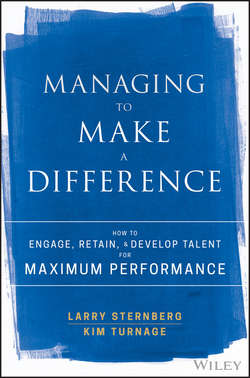Читать книгу Managing to Make a Difference - Sternberg Larry - Страница 11
На сайте Литреса книга снята с продажи.
SECTION I
CULTIVATE POSITIVERELATIONSHIPS
CHAPTER 5
TOLERATE UNDESIRABLE BEHAVIORS
ОглавлениеIf you are committed to cultivating positive relationships with people through accepting them as they are, you will inevitably run into conflicts between how people really are and how you wish they would be. What will you do in those instances? Where will you draw the line when accepting people as they are rubs you the wrong way?
The General Manager and the Director of Sales
I was teaching a seminar for a group of hotel general managers and one of them said, “Larry, help me apply what you're talking about to my director of sales. She is notoriously late to all meetings. And we have a standard that if we say a meeting that starts at eight, we do not mean 8:05.”
This was a luxury hotel in which timeliness was a sign of excellence, precision, and attention to detail. Meetings started on time. The general manager was asking, “Given our culture and standards, what am I supposed to do about this? We consider that behavior disrespectful toward the other people in the meeting.”
I said, “Well, tell me about the director of sales. How is she doing against the budgeted goals?”
He replied, “She's blowin' 'em away.”
“Okay,” I said, “how is she doing with her people? Is she a good mentor?”
“Oh yeah,” he said, “she trains people, and we promote them out to other hotels. People are standing in line to get into this department to work for her.”
I responded, “What's your problem?”
“She's late to meetings!”
I said, “Do you want a director of marketing who is on time to meetings, or do you want a director of marketing who blows away her revenue goals and develops great people for your organization?”
He said, “I want it all!”
Lesson
With real human beings in the real world, you do not get it all. Everybody has aces and spaces. In both business and personal life, tolerance of shortcomings is required to cultivate close positive relationships.
In every job there are things that are Nice to Have (such as timeliness in the previous story) and Need to Have (such as the ability to close sales). Be most tolerant in the Nice-to-Have category.
But how much undesirable behavior should you tolerate? The unsatisfying answer is: it depends. The more valuable a person is to an organization, the more inclined an organization will be to give that person special treatment.
The Best Car Salesman
Hank, a general manager of a large, successful Lincoln-Mercury dealership told me this story. For context, it is important to understand that Saturday is an “all-hands-on-deck” day for car dealers. Nobody gets Saturday off.
Tom had been the number one salesman in this dealership for 18 years in a row. One day, he walked into Hank's office and said casually, “My son's playing football this year, so I'm taking Saturdays off to watch him play.” This was not a request.
A seminar participant asked, “What did you do?” Without hesitation, Hank replied, “I gave him Saturdays off. He's my top guy.”
Experiment: Tolerating Undesirable Behaviors
1. The next time one of your best people exhibits an annoying behavior, ask yourself, “Is that Nice to Have or Need to Have?” Be honest.
2. If it is Nice to Have, just let it go. Nobody is perfect. Accept him with all his aces and spaces.
3. Focus on helping that person amplify his talents and strengths – the things that really make a difference in his productive performance.
4. Do this with all of your direct reports for 90 days.
5. Reflect on what you have learned. Do you see a difference in morale and engagement? How do you feel now that you are not asking people to change things that do not really matter all that much?
The downside of this accommodation typically involves dissatisfaction from other employees. “Hey, why does he get Saturdays off?” Of course, this is an easy one. Hank can reply, “As soon as you're number one for 18 consecutive years, I'll be happy to give you Saturdays off!” The downside of not giving the top guy Saturdays off is that he goes to another dealership. We are talking about favoritism here, but favoritism that is earned based on superior performance.
The Chef with Long Hair
I was on the pre-opening training team for The Ritz-Carlton Barcelona. My responsibilities included training the public space cleaning team. I do not speak Spanish so a couple of employees served as interpreters. We were enjoying lunch as a team in the employee dining room when Gunter came in to get a cup of coffee. Gunter was, at that time, the number one chef de cuisine in the entire company. Gunter had hair down to the small of his back, in flagrant violation of the company standard for male hair length.
All the employees on my team started speaking at once. I could see they were talking about Gunter, but I could not understand what they were saying, so I asked one of my interpreters. She said, “They are saying he must be really, really good at his job.”
Lesson
Employees are eminently capable of understanding why you are tolerating certain kinds of undesired behavior from top performers. And what's more, they accept it.
A more challenging situation occurs when the top performer is undermining the culture, mistreating people, or acting immorally or unethically. How much of that should you tolerate? It is up to you. The decisions you make in these situations define what the fundamental values system of your culture really is. Where you draw the line in any situation speaks powerfully about what you really value.
